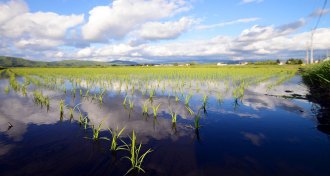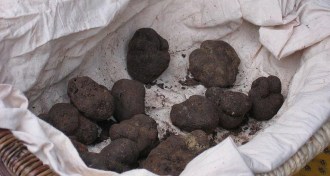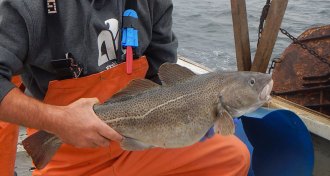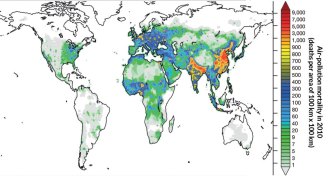Environment
-
 Climate
ClimateIce rafts traveling farther and faster across the Arctic Ocean
Climate change may be causing Arctic sea ice to travel farther and faster than it did 15 years ago, taking pollutants and other material along for the ride.
-
 Environment
EnvironmentYear in review: BPA alternatives aren’t benign
Evidence is accumulating that at least one popular alternative to bisphenol A can enter the body and trigger developmental and physiological changes.
By Janet Raloff -
 Climate
Climate195 nations approve historic climate accord
The Paris climate talks end with delegates from 195 nations releasing a hard-fought agreement to curb climate change and limit warming to 2 degrees Celsius.
-
 Climate
ClimateGlobal carbon emissions fell in 2015, despite economic growth
Society’s carbon footprint fell slightly in 2015, largely due to decrease coal consumption in China, researchers report.
-
 Earth
EarthHumankind’s water use greater than thought
Humans’ global water footprint increases when accounting for water losses from water management practices.
-
 Life
LifeTruffles aren’t laced with radioactive cesium
Fallout from the Chernobyl disaster hasn’t made truffles dangerously radioactive, scientists find.
-
 Oceans
OceansRising temperatures complicate efforts to manage cod fishery
Higher water temperatures in the Gulf of Maine could play a role in Atlantic cod crashes.
-
 Environment
EnvironmentAir pollutants enter body through skin
Although scientists have largely viewed skin as an unimportant portal to blood for toxic air pollutants, new human data show that skin can surpass lungs as a route of entry.
By Janet Raloff -
 Earth
EarthSurface spills near fracking sites implicated in water contamination
Chemical spills from fracking operations are the likely source of chemicals found in drinking water wells in northeastern Pennsylvania.
-
 Environment
EnvironmentHome fires, farm fumes are leading causes of air-pollution deaths
Deadly air pollution comes from surprising sources, but toxicity of different types is still up in the air.
By Beth Mole -
 Animals
AnimalsShipwreck provides window into Tudor-era cod fishing
In the 1500s, England was feeding its navy with fish caught far from home, a new study finds.
-
 Environment
EnvironmentMolting seals shed mercury along with fur
Seals spew amassed mercury when they shed, creating hotbeds of pollution in otherwise pristine coastal environments.
By Beth Mole